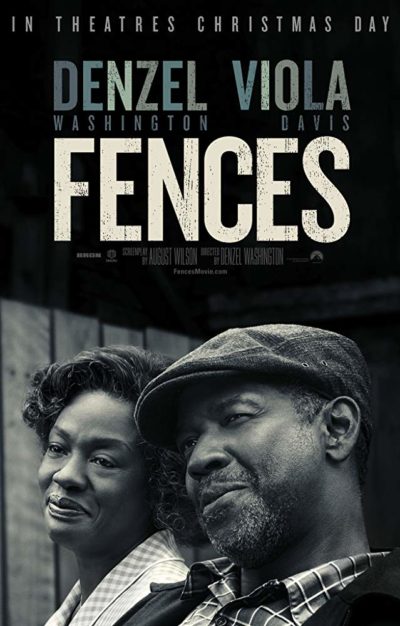
Set in the 1950s, director Denzel Washington plays Troy Maxson, an ex-baseball player now making his living as a dustman whilst struggling to understand his role in a changing world. Viola Davis is his wife, Rose.
There is plenty to stop me getting into Fences. From the very first scene, it makes it stage roots evident. It is hard to explain it, but there is something about the showy, expositional heavy dialogue that belongs to the theatre rather than the cinema. Also, in striving for being realistic and poetic, there is a tendency to put words more lucid and intelligent in to the characters’ mouths than is believable. Also, as good as Washington and Davis are in the quieter parts of the movie, their tendency to show off their ACTING whilst delivering the big speeches just does not work in the more intimate confines of a film. They are not the worst culprits though, that accolade belongs to Mykelti Williamson as Gabe, Troy’s mentally challenged brother. Full of mannered tics, it is an unconvincing turn.
I also had a problem with the baseball background. It is a sport that I can’t feel a connection with – what is it with the big mitts they wear? Are they scared of breaking a fingernail? But it holds almost a mystical status in American culture, and the script is littered with references to it, and analogies involving the sport.
Finally, it is another film not knowing where to end. Bloated at 2 hours 20 minutes, it would have been much better as lean 90 minute offering.
However, the film does work in some respects. The back story of the changing status of black people in America, and specifically how Troy’s life could have been different if he had be born later, is interesting. Outside of the grandstanding moments, the script has some good salty dialogue and there are some stand out performances in the supporting cast, especially by Stephen Henderson as Troy’s best friend, and in some ways enabler, Jim. By underplaying, Henderson steals the film from the more flashy actors.
I was also impressed by Charlotte Bruus Christensen’s muted cinematography and Marcelo Zarvos’ score, that really plays a part towards the end of the film.
Rating: 5.5 out of 10